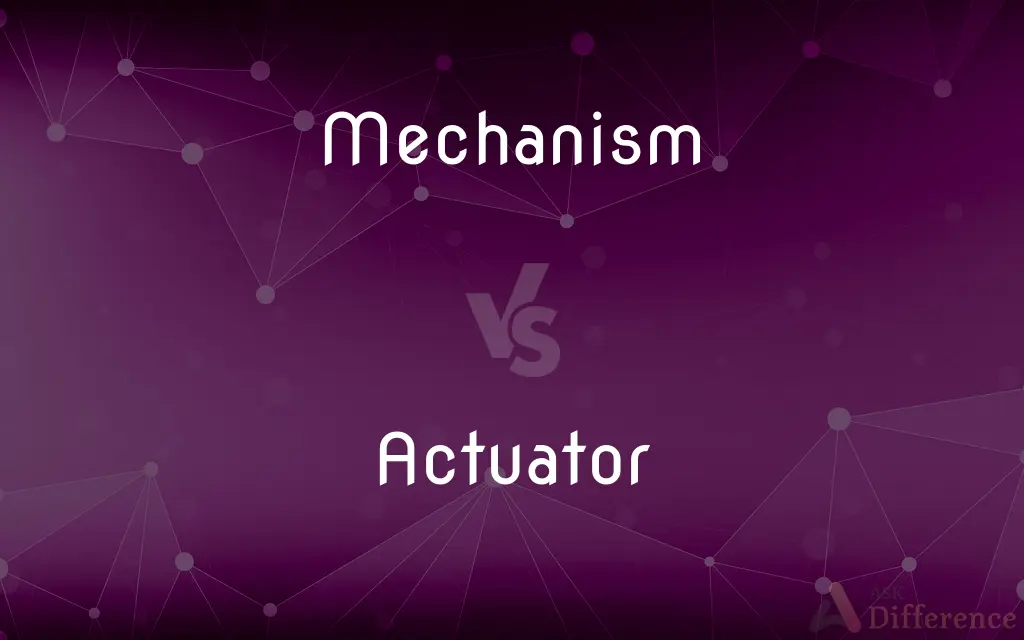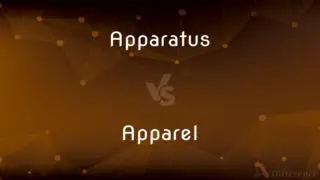Mechanism vs. Actuator — What's the Difference?

Difference Between Mechanism and Actuator
ADVERTISEMENT
Compare with Definitions
Mechanism
A machine or mechanical appliance.
Actuator
An actuator is a component of a machine that is responsible for moving and controlling a mechanism or system, for example by opening a valve. In simple terms, it is a "mover".
Mechanism
The arrangement of connected parts in a machine.
Actuator
One that activates, especially a device responsible for actuating a mechanical device, such as one connected to a computer by a sensor link.
Mechanism
A system of parts that operate or interact like those of a machine
The mechanism of the solar system.
ADVERTISEMENT
Actuator
Something that actuates something else.
The mind is the actuator of the body.
Mechanism
An instrument or a process, physical or mental, by which something is done or comes into being
"The mechanism of oral learning is largely that of continuous repetition" (T.G.E. Powell).
Actuator
A usually electric device that causes a mechanical device (i.e., a mechanism) to be switched on or off. For example; an electric motor that opens and closes a valve.
Mechanism
A habitual manner of acting to achieve an end.
Actuator
(computer hardware) The mechanism that moves the head assembly on a disk drive.
Mechanism
(Psychology) A usually unconscious mental and emotional pattern that shapes behavior in a given situation or environment
A defense mechanism.
Actuator
(electrical) A relay that controls the flow of electricity.
Mechanism
The sequence of steps in a chemical reaction.
Actuator
One who actuates, or puts into action.
Mechanism
(Philosophy) The doctrine that all natural phenomena are explicable by material causes and mechanical principles.
Actuator
A mechanism that puts something into automatic action
Mechanism
(within a machine or machinery) Any mechanical means for the conversion or control of motion, or the transmission or control of power.
Mechanism
Any combination of cams, gears, links, belts, chains and logical mechanical elements.
Mechanism
A group of entities, such as objects, that interact together.
Mechanism
A mental, physical, or chemical process.
Mechanism
Any process of, or system designed to manage useful energy conversion.
Mechanism
(philosophy) The theory that all natural phenomena can be explained by physical causes.
Mechanism
The arrangement or relation of the parts of a machine; the parts of a machine, taken collectively; the arrangement or relation of the parts of anything as adapted to produce an effect; as, the mechanism of a watch; the mechanism of a sewing machine; the mechanism of a seed pod.
Mechanism
The series of causal relations that operate to produce an effect in any system; as, the mechanism of a chemical reaction.
Mechanism
Mechanical operation or action.
He acknowledges nothing besides matter and motion; so that all must be performed either by mechanism or accident.
Mechanism
An ideal machine; a combination of movable bodies constituting a machine, but considered only with regard to relative movements.
Mechanism
The atomic process that occurs during a chemical reaction;
He determined unique mechanisms for the photochemical reactions
Mechanism
The technical aspects of doing something;
A mechanism of social control
Mechanisms of communication
The mechanics of prose style
Mechanism
A natural object resembling a machine in structure or function;
The mechanism of the ear
The mechanism of infection
Mechanism
(philosophy) the philosophical theory that all phenomena can be explained in terms of physical or biological causes
Mechanism
Device consisting of a piece of machinery; has moving parts that perform some function
Share Your Discovery

Previous Comparison
Apparatus vs. Apparel
Next Comparison
Krill vs. Prawn














































